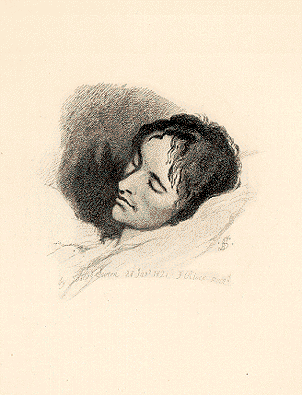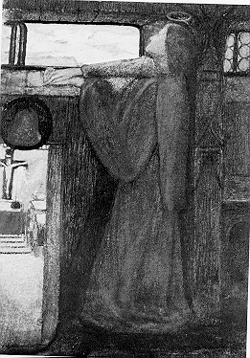Cultural Studies:
John Keats's (1795-1821)
"Ode to Psyche"--
Masculine Quest, or Poetic Feminization?
"The Eve of St. Agnes"--Romantic Passion, Imagination or Rape?
Negative Capability:
"when man is capable of being in uncertainties, Mysteries,
doublts, without any irritable reaching after fact & reason..." (Letters
I, 193)
Imagination:
"may be compared to Adam's dream--he awoke and found
it truth" (Letters I, 185)
|
Right:
(Portrait of John Keats in Rome, shortly before his
death from tuberculosis in February 1821, by his friend Joseph Severn.) |

Copyright © 1997, The British Library Board
British Library, Ashley MS 4165, f.v
FromPortico
- The British Library's Online informationServer |
"Ode to Psyche"
"The Eve of St. Agnes"--
multiple texts and frames
1. the juxtaposition of different worlds (the beadsman's
vs. the banquet guests'; Porphyro's vs. the bedlame's; Porphyro's vs. Madeline's,
the two lovers' vs. the outside world).
2. the poem and the painting--Madeline's bedroom--outside time

Arthur Hughes, The Eve of St. Agnes, London, Tate
Gallery (from Women/Image/Text)
Please pay attention to the multiple frames, including
the stanza that decorates the frame:
They told her how, upon St. Agnes' Eve
Young virgins might have visions of delight,
And soft adorings from their loves receive
Upon the honey'd middle of the night, |
If ceremonies due they did aright;
As, supperless to bed they must retire,
And couch supine their beauties, lily-white;
Nor look behind, nor sideways, but require, |
Of heaven for upward eyes for all that they desire.
|
more paintings--Study for Hughes's "The Eve of St.
Agnes"
"The Eve of St. Agnes" by E. Siddal
allusion ----from The Visionary
Company (by Harold Bloom)
"Aphrodite, jealous of the beautiful Psyche who is drawing her admirers
away, commands Eros to afflict [Psyche] with love for a base creature.
But he falls in love with her, and comes to her regularly, always in the
darkness. When, against his wishes, she lights a candle to see him,
he flees from her. She quests for Eros by performing tasks set by
Aphrodite, the last of which is a descent into the underworld. ..." (399)
the narrator eating up Psyche (from "Poetry
as Enforcement") ?
In response to the concatenation of negatives of non-being, the poet
asserts himself Psyche's grove and shrine, which, in
practice, make up the sarcophagus (literally 'flesh-eating' coffin)
of her individuality. The poet indeed is about to absorb her
identity completely. D. L. Hoeveler has astutely observed that the
Romantic poets were very keen on 'creat[ing] female
characters with whom their male heroes (often slightly veiled versions
of themselves) could merge in a sort of apocalyptic
union'. Put in an even more straightforward way, Hoeveler stresses
how 'The Romantics cannibalistically consumed these
female characters, shaped them into their ideal alter egos, and most
of the time destroyed them by the conclusion of the
poem' (27). In the ode, the poet's ploys of conjuring Psyche into being
through ritualistic invocation, only to deconstruct her
afterwards, fits this scheme very well. The poet came to the sacred,
'scarce espied' bower, saw the goddess, recognised her
and thus acquired absolute ascendancy. 'I see and sing' and, one may
complete, conquered; or Vene vidi vici .
The 'Ode to Psyche' is by no means the only instance in Keats's work
which contains such an all-devouring propensity in the
persona. The following excerpt, taken from a sonnet addressed to Keats's
beloved, Fanny Brawne, is particularly revealing:
O, let me have thee whole, all, all be mine!
That shape, that fairness, that sweet minor
zest
Of love, your kiss, those hands, those eyes
divine,
That warm, white, lucent, million-pleasured
breast,
Yourself your soul in pity give me all,
Withhold no atom's atom or I die
('I cry your mercy', ll. 5-10)
revision of "St. Agnes"
"It is somewhat ironical to reflect that the hero's plight was in
certain ways similar to Keats's own when he discovered that passages
in the completed manuscript of the poem offended the scruples of his publishers
and he was forced to revise them, partly unwillingly, to bring them into
conformity with the demands of propriety." (Sperry, Stuart
M. Keats the Poet. Princeton UP, 1973, 213)
"The devices of disguise and censorship perform an integral
and even aesthetic function throught the whole formation of the work..."
(213)
four possible readings of "Eve of St. Agnes"
p. 100
Pearce, Lynne. Women/Image/Text: Readings in
Pre-Raphaelite Art and Literature. NY: Harvester/Wheatsheaf,
1991.
1. philosophy of love and beauty at once.
2. a poem about the Imagination: a poem which celebrates
the power of the Imagination in the face of Love and Death.
3. mysticism--"Earl Wasserman, 'Here in the chamber
of Maiden Thought the ascent of the sacle of intensities is acted out,
and P and M unite in a mystic blending of mortality and immortality, chastity
and passion, the moonlight of perfect form and the ruddiness of intense
experience."
4. Jack Stillinger--rape
Further references on the web:
 Electronic Texts:
Electronic Texts:
-
The Poetical
Works of John Keats --E-Text from Bartleby Archive
-
SELECTED
POETRY OF JOHN KEATS (1795-1821)--E-Text from U. of Toronto
-
The Eve of St. Agnes: E-Text
 Biographies:
Biographies:
-
Keats' life:
John "Doctor" Keats--a brief and interesting biography
-
Keats,
Teats, and the Fane of Poesy--a psychoanalytic study of Keats' sensual
and contradictory images (esp. about poetry) and his melancholy.
Interesting Associations! Relating "Ode to Psyche"
to "Ode on a Grecian Urn," the critic said, 'Psyche's "fane" leads
to the images of temple, altar, and sacrifice, and to the drive for psychic
at-one-ment or identity that occasions them. Ideal poesy is itself a temple,
like the "living fane of sounds" to be found in Milton ("Lines on Seeing
a Lock of Milton's Hair," 12 [early draft]) and contrasted with the author's
own "burnt sacrifice of verse / And melody" (9-10). But Keats's classic
picture of "the sacrifice" includes, as in "Ode on a Grecian Urn," an "altar,"
the "mysterious priest," and "that heifer lowing at the skies." ... Perhaps
the image impresses Keats in part owing to the colloquial use of heifer
for woman (stemming from Samson's "ploughed with my heifer" metaphor
in Judges 14:18). '


